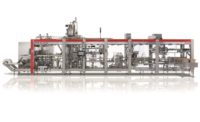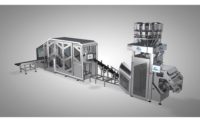The latest form/fill/seal (FFS) systems are designed for versatility and are adaptable to many different bag types, film types, and bag sizes, which is good news for bakery and snack producers. They also incorporate improved sanitary design and can handle green sustainable materials such as paper packaging.
Features in demand
Manufacturers agree that improved sanitary design, which protects consumers and helps bakery and snack producers meet food safety regulations, is a key area of recent innovation. One of the primary goals is to eliminate harborage areas on packaging equipment. By removing areas that can gather and grow bacteria, food companies greatly reduce the risk of product contamination.
Sanitary design of FFS equipment continues to evolve as food manufacturers demand more food safety features. The need for non-flat surfaces and open design is critical, according to says Mike Wolf, product line manager, Triangle Package Machinery Co., Chicago. “Our company’s new generation of vertical baggers features a solid stainless steel round bar frame, which is fully welded and comes with optional electropolishing to further seal the frame to prevent harborage.”
The servo motors for sanitary environments also have evolved and are now IP69K-rated for washdown. The IP69K rating provides protection against ingress of dust, high temperature and high pressure water—making machines ideal for use in conditions where equipment must be carefully sanitized.
“Those ratings are featured on Triangle baggers as well as NEMA 4X control boxes with sensors rated at IP67 or better for washdown,” Wolf adds.
The continued focus on sanitary design and food safety has had a major impact on new FFS machine design, agrees Brad Baker, North America sales director, Syntegon Packaging Technology LLC, New Richmond, WI. Features such as no hollow-body frames, and the elimination of product crumb collection points are among the many considerations of machine development.
“Allergen considerations have driven the greatest discussion about clean design, but we see more complete washdown applications required in the bakery and snack market,” Baker says. “Therefore, Syntegon’s FFS machines are designed for easy disassembly for cleaning and reassembly for vertical start-ups. Removable parts can withstand abuse from late night clean-up activities, and can be re-installed to a position that guarantees a vertical start-up the next morning.”
Formost Fuji, Woodinville, WA, offers a sanitary-design flow wrap machine that allows users to completely disassemble the wrapper, leaving it wide open for cleaning, inspection and maintenance. “Also, a quick-disconnect infeed conveyor can be easily removed and rolled away from the wrapper body to a stand-alone drive to assist in the sanitation process,” says Angela McDaniel, marketing coordinator.
More innovations
Along with improved sanitation features, the latest FFS equipment offers quick format changeovers. Effytec USA LLC, De Pere, WI, has developed a range of horizontal FFS machines that use servo technology to provide quick format changeovers. The user can save machine settings into a recipe so that changeover is 90 percent automatic by the machine. A pouch format changeover (width, height, gusset) reportedly can be performed in 15 minutes.
Effytec USA also is designing FFS machines that can run 100 percent recyclable films, zippers, and spouts. The company has a machine installed at Nova Chemicals in Calgary, Canada, in their lab for testing 100 percent PE recyclable films, according to Roger Stainton, president.
Formost Fuji recently introduced the Box Motion Sanitary Design Wrapper, which offers many of the same features as its rotary Sanitary Design model but can accommodate thicker and hard-to-seal films. “This is a great option for bakery and snack products that are sensitive to outside elements and require additional protection,” McDaniel says.
In addition, Formost Fuji recently introduced the FW3400 CX II flow wrapper in rotary or box motion. “It offers an economical solution that is energy efficient, maintenance friendly and easy to operate. Bakery and snack products that need to be run at high speeds for long periods of time are a great fit for this machine,” McDaniel adds.
The latest FFS equipment also handles a wide range of bakery and snack products. Vertek machines from Paxiom Group, Las Vegas, can package dried fruit, nuts, trail mix, and popcorn. “The Vertek series of vertical FFS machines can package stick pack, pillow, and gusseted pouches in a variety of film structures including laminate, metalized structures, and polyethylene,” says Nicholas Taraborelli, vice president. “The Vertek 800/1200 handles pouch widths up to 12 inches wide while the Vertek 2400 handles bags up to 24 inches wide.”
Paxiom Group’s R2B series of horizontal FFS machines can run both 3-sided seal and 4-sided seal pouches with zipper closures as well as shaped pouches that require die cuts. The company’s XPdius Elite i130 combines horizontal flow wrapping and vertical bagging into one compact machine. “This vertical FFS machine is often used for high-speed applications ranging from 50 to 100 packages per minute and can produce pouches up to 13 inches wide,” Taraborelli notes.
Triangle Package Machinery has introduced its next-generation Delta vertical bagger, which features many sanitary features. “It represents the culmination of 98 years of the company’s sanitary bagging experience. It’s ideal for any snack producer looking for a sanitary machine for bagging products—from baking mixes to nuts,” Wolf says.
Triangle Package Machinery also has introduced a liquid fill bagger, which is designed for liquid or pump-able food applications such as large bags of frosting or pie fillings. It features a squeegee system that keeps the liquid product out of the sealing area, allowing for the creation of clean, perfectly sealed bags. “This helps prevent product loss and allows for more salable bags out the door,” Wolf notes.
Modular design is another feature of new FFS machines. Reiser, Canton, MA, offers the compact VARIOVAC Optimus FFS machine, an entry-level solution with a low cost-of-ownership. It features a modular design built around a sturdy frame. The machine allows quick and easy changes to package size. Up to 40 recipes can be programmed and saved. Many printing and labeling options are available.
For high-volume applications, Reiser offers the VARIOVAC Primus FFS packaging machine, which meets the needs of larger plants. Easily modified, the machine can be lengthened, components can be added and web widths can be changed. Featuring a four-point pneumatic lifting system, the Primus creates shaped, semi-rigid and sophisticated packages. Up to 80 recipes can be programmed and saved.
Use of renewable packaging material is another feature of the latest FFS equipment. Syntegon Packaging Technology along with BillerudKorsnäs, a provider of renewable packaging material, has developed “green” Sealed Paper Packaging for use on its vertical FFS machines. Called the ZAP-Module, it is based on the SVE machine concept. SVE is a twin-tube, continuous motion vertical bagger designed for high output in minimal floor space.
“We’ve introduced a variation of our SVE 2520 DZ FFS machine that can be integrated with the ZAP-Module for inline application of sealing agent for tightly sealed paper bags,” says Gene Streeper, key account manager. “We’ve added this feature without compromising on versatility with respect to more conventional packaging materials.” The mono-material paper packaging offers a low carbon footprint, thus making for a cleaner environment.
The future
What near future advances do manufacturers foresee in FFS systems? The use of smart sensors is one possibility, according to Wolf. “As food producers deal with labor gaps and training issues, they will need FFS equipment that is easy to use.” To help address this issue, Triangle Package Machinery Co. has started to incorporate IO-Link smart sensors that allow for simpler machine setup. This also enables a food producer’s plant-level system to “see” the status of various items on the machine.
“For example, an IO-Link sensor is used to measure the film roll size so that the plant system can query the machine to ‘see’ the film roll remaining in each machine,” Wolf says. “This tells the operators exactly when the machine will run out of film material so they can be ready to make the change, helping ensure minimal downtime.”
Stainton foresees a continued effort to find ways to make FFS machines easy to operate, and more automated for adjustments and format changeovers. “Some food producers are asking for preventative maintenance programs whereby the Human-Machine Interface could send warnings to operators and maintenance team to do certain maintenance procedures and ‘health’ checks.”




